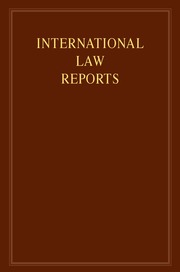No CrossRef data available.
Article contents
Crimea Annexation Case
Published online by Cambridge University Press: 01 January 2021
Abstract
Extradition — Treaties — European Convention on Extradition, 1957 — Extradition for criminal prosecution — Whether permissible for Russian Federation to request extradition of Ukrainian nationals for crimes committed in Crimea prior to incorporation of Crimea
War and armed conflict — Force — Use or threat of force — Charter of the United Nations, 1945, Article 2(4) — Prohibition of the use or threat of force a peremptory norm — Whether conduct of Russian Federation in relation to Crimea violating prohibition
State responsibility — Peremptory norms — Obligation not to recognize situations created in violation of peremptory norms — International Law Commission, Articles on Responsibility of States for Internationally Wrongful Acts, 2001, Article 41(2) — Customary status of Article 41(2) — Whether Austria having an obligation not to recognize incorporation of Crimea
Territory — Annexation — Occupation — Treaties — Treaty between Russian Federation and Republic of Crimea on Accession of Republic of Crimea to Russian Federation and on Forming New Constituent Entities within Russian Federation of 18 March 2014 — Legal status of Crimea under international law — Whether incorporation of Crimea by Russian Federation lawful under international law — Whether sovereign acts by Russian authorities for or pertaining to Crimea valid under international law
Treaties — Legal effects — 2014 Accession Treaty between Russian Federation and Republic of Crimea — Territorial scope of European Convention on Extradition, 1957 — Whether treaties between Russian Federation and Austria extending to Crimea — The law of Austria
- Type
- Case Report
- Information
- Copyright
- © Cambridge University Press 2020


